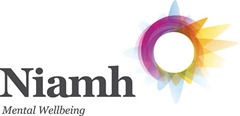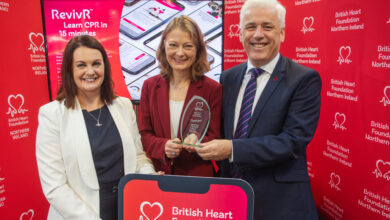Mental well-being for all
 Niamh Chief Executive Peter McBride discusses how its focus is broadening from supporting people with mental illness to putting forward a strong message about well-being to the whole population.
Niamh Chief Executive Peter McBride discusses how its focus is broadening from supporting people with mental illness to putting forward a strong message about well-being to the whole population.
“Niamh is about mental health and well-being for all,” Peter McBride explains. “And the ‘for all’ bit of that is really important.” Historically, mental health organisations tended to focus on supporting people recovering from mental illness. Whilst this, of course, continues to be a very important part of Niamh’s work, they believe they have “something important to say to everybody in society about health and well-being, particularly mental health and well-being.”
Essentially, this means lobbying for change in societal attitudes and stigma towards mental health. Everyone has mental health needs and one in four of the population will experience a mental illness during their lifetime.
“That means that three in four of us will go through times of ups and downs when we might get slightly depressed, stressed and anxious,” McBride comments. “We don’t necessarily need to be treated by a psychiatrist but we need to know what to do, how to get help and how to be a bit more psychologically resilient.”
Niamh was established 55 years ago by Lady Margaret Wakehurst, the wife of the Governor of Northern Ireland, whose son suffered from schizophrenia. He was looked after in hospital but there were no services to continue that care after he had been discharged. Niamh was set up as a Beacon Centre where he could come and receive support during the day and carry out meaningful engagement with other people. Its work grew and during the 1980s and 1990s, it started to provide ‘care in the community’ in line with government policy.
“Up until that point, hospitalisation was the main way in which people with severe mental illness were cared for,” McBride remarks. “After that point, organisations like ours were tasked with looking after those chronically ill people but doing it in community settings.”
Niamh’s range of services
Niamh’s vision is one of mental health and well-being for all. The positive nuance of this statement looks to promote and support recovery and a journey to well-being for a diverse range of individuals in society. For example, Niamh’s current range of services has been developed to include an older people’s programme which assists them on living a more active life in their own community.
This not only addresses an identifiable need among an ageing section of society – who have faced challenges and stark realities of cutbacks in the provision of housing support – but it also demonstrates the vision of Niamh to extend its well-being ethos beyond those sections of society who have mental ill-health to also focus on maintaining mental well-being.
 Niamh is in a period of strategic growth and has clear ambitions for enhancing and developing the critical services that are needed for new and existing stakeholders in the medium to longer term. Niamh’s current range of services has been developed in response to need, changes in policy and evidence-based research which all continue to inform the future direction of travel. This service base includes Beacon, Inspire, a focused Research and Policy division, and Carecall – Niamh’s first social enterprise:
Niamh is in a period of strategic growth and has clear ambitions for enhancing and developing the critical services that are needed for new and existing stakeholders in the medium to longer term. Niamh’s current range of services has been developed in response to need, changes in policy and evidence-based research which all continue to inform the future direction of travel. This service base includes Beacon, Inspire, a focused Research and Policy division, and Carecall – Niamh’s first social enterprise:
• Beacon provides 24/7 support services to people with experience of mental illness through supported housing, day support and advocacy services. This is the largest division in the Niamh family and has grown substantially over the last four years. In 2013, Beacon’s day support schemes provided a range of recovery-focused programmes to 1,500 people per week and its supported housing services provided accommodation for 391 people. Its four advocacy services dealt with almost 2,000 requests for advocacy support and floating support provided services for a further 100 people.
• Inspire provides support for approximately 90 people with learning disabilities in five residential locations in each of the health and social care trust areas across Northern Ireland. It is the newest Niamh service, having commenced in October 2013, and extends the reach of Niamh from mental health into learning disability.
• Research and Policy provides both an evidence base upon which Niamh’s services are built and a voice with which to positively influence policy and inform society in relation to mental health and well-being issues.
• Carecall provides therapeutic support through workplace-based well-being services such as employee assistance programmes (EAP) and counselling, and training and preventative services in a wide variety of contexts. Last year, Carecall delivered over 23,000 counselling sessions to over 5,000 people and made these services available to 465,000 people, including 114,000 students in regional further education colleges.
Carecall’s client profile includes those employees of companies who have moderate anxiety, depression or stress which can often be a result of bereavement, bullying, addiction, marital/relationship problems or workplace difficulties. As sickness absence and poor productivity (most often due to stress) costs UK employers billions each year, the services of Carecall make mental health and well-being a real-time business case.
Social Enterprise
A social enterprise, Carecall was set up in 1999 and offers employee assistance programmes (EAPs) as a model of intervention in the workplace. Profits are re-invested into Niamh to help fund its other mental health and well-being services. Carecall can offer its service to any organisation in any sector in Northern Ireland and beyond and currently offers support to every teacher on the island of Ireland.
“Its job at the start was to take everything we knew about mental health and well-being and apply it, particularly in the employment setting,” McBride says. Carecall also provides training on emotional resilience – therefore helping staff to manage stress in themselves and managers to recognise it in others. Helping people with emotional intelligence and recognising the impact of how they behave on the people around them can mean better relationships at work and potentially fewer disputes.
In 2012-2013, the service delivered 103 workshops, attended by 2,524 delegates, with ‘building emotional resilience’ and ‘managing stress’ being the most popular themes. Eighty-five to 90 per cent of those attending said that they would recommend the courses to a colleague.
“Social enterprise has historically been an important part of what we do,” McBride continues. “We see it as also a significant aspect of our future.” With around 500 staff, Niamh has a “huge amount of talent” which can be mobilised in different areas of social entrepreneurship.
Community Focus
McBride senses a tension in Northern Ireland between its traditional dependence on statutory services and moving services into the community. “There is a kind of in-built resistance to it in the way that things are set up at the moment,” he adds, “but that resistance is not insurmountable.”
The voluntary sector also needs to be much more vocal about how it meets the same standards of compliance as the state, and the flexibility and demonstrable high quality of services that it can provide.
“Our quality is comparable with statutory services and I’m not sure that we’ve been vocal enough about that,” McBride affirms. “I think there is a need now for a new kind of relationship between statutory services and the community sector.”
In the past, this relationship was based on patronage with the state setting aside money for the voluntary sector so it could help alongside statutory services. Now, the sector sees itself as a serious service provider and an important part of the health economy.
“We operate in a very business-like way,” he states. “We are highly compliant. We are regulated in the same way as other health services are regulated. Many of us have systems and processes that match the statutory sector in terms of governance.
“There’s more demand and also with Transforming Your Care, the principles are ‘shift left’ and the move of services into the community,” he relates. “We’ve certainly embraced those principles. We would argue that most mental health services – even acute services – could be delivered more effectively in community settings.”
Niamh offers a credible alternative to state provision and a more mature relationship is now developing. The real anxiety about moving services away from the state is that quality will suffer. In reality, voluntary sector services are highly regulated and demonstrably of high quality.
Policy
Decisions over welfare reform also have an impact on mental health. Any changes in social security benefits can provoke anxiety among service users. They therefore perceive welfare reform as a “serious threat” and the assessments for personal independence payment (PIP) do not necessarily take the full range of issues related to mental illness into account.
“With mental illness, you can be okay one day and completely dysfunctional the next,” McBride explains. “The measures that are used aren’t particularly sympathetic to people with the experience of chronic mental illness.” Niamh’s clients view employment as positive but full-time employment may be an unrealistic option for them. Welfare reform “pushes the debate away from a realistic engagement with employment into an all-or-nothing discussion.”
Implementing the policy would save money but McBride contends that there would be “at least an equal and opposite cost” as people end up going back into hospital and using other health services.
“I think mental health is a particular area of concern around welfare reform,” he comments. “The English experience would substantiate that and I think there should be more effort based on learning from what happened in England and not repeating some of those mistakes here.”
Niamh’s policy agenda also includes mental capacity legislation. This takes in the right of individuals to make decisions (legal capacity) and their ability to do so (intellectual capacity).
At present, a person presenting with suicidal tendencies can be hospitalised against their will by a GP and social worker. Capacity legislation puts a much greater focus on a person’s ability and rationality to decide themselves what is best for them. The risk to other people is always taken into account but balanced by the person’s right to decide about the kind of support and treatment that they should receive.
The most controversial aspect is the possibility of decision-making being taken away from the individual. Under current law, those rights are transferred away from the person. New legislation would allow for a much more human rights-based focus for mental health interventions.
Stigma
Of overarching importance in Niamh’s policy and research focus is the area of stigma and pre-conceptions about mental illness.
On the basis that one in four people will experience mental illness and three in four will have “ups and downs” in their mental health, the issue of stigma is important “because stigma affects how people seek help.” If a person has a mental illness associated with a high level of stigma, they will be less likely to get early help because they think they will be looked down upon, their friends won’t support them or society will see it in a particular way.
“Combating stigma is not just a rights issue,” he states. “It is about improving the mental health of society. That’s not least to benefit people with experience of mental illness but actually, I would argue, to benefit the rest of society.”
Recent Equality Commission research has shown a slight rise in stigma with 30-40 per cent of people preferring not to work or live with a person with mental illness. If stigma about mental illness can be reduced, people will be more likely to access support more appropriately and earlier and therefore be less likely to reach the same level of crisis.
A national stigma campaign – under the theme ‘Time to Change’ – has been rolled out in England and Wales, and Niamh is dedicated to tackling stigma in the Northern Ireland context in an intentional and focused way.
“As a member of the Global Anti-Stigma Alliance, we have been working closely with successful campaigns including ‘Time to Change’ in England and Wales and ‘See Me’ in Scotland on this key policy area,” McBride says in conclusion. “Over the coming months, we will continue to work with the Equality Commission for Northern Ireland and other mental health organisations to produce good practice guidance and a mental health charter for the workplace.”
Organisational Development
The organisation has recently won the EFQM Ireland award for excellence, which establishes it as an exemplar on the island, and it is now aiming for the European award. Niamh is also the first and only organisation in Northern Ireland to receive Investors in People gold accreditation at the first assessment.
Both awards reflect a “significant transformation” over the last three years with a strong focus on modernisation, engagement with staff and “really getting ourselves geared up for growth, development and innovation.”
McBride adds: “For us, the future is about further developing our services, doing more of what we do really well and seeking to engage more fully with the rest of the community and with the Health Service.” This includes a higher public profile for Niamh and mental health issues in general, thus helping people to understand the importance of looking after their mental health and well-being.
 Niamh
Niamh
80 University Street
Belfast, BT7 1HE
Tel: 028 9032 8474
Web: www.niamhwellbeing.org
Twitter:@NIAMHWellbeing
Facebook: NiamhWellbeing





